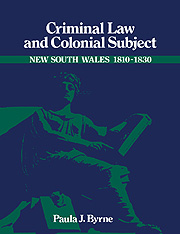Summary
In 1822 Eleanor Walsh gave evidence to the magistrate at Bringelly of how she and her husband discovered that Henry Crane, servant to Oxley, had killed their heifer and taken the meat: ‘I went with my husband to the spot and told him to track the shoemarks on the ground. There were three men, one with very long nails on the side of each shoe, another barefoot, we tracked them to Mr. Hooks.’ Her husband could find no evidence of the heifer and so went further, with a constable, to Hassall's farm and then to Oxley's. At Oxley's they went to the carpenter's shop and observed Henry Crane. They saw he had a shoe with three long nails on the side. He tried to swap his shoes with another man in the carpenter's shop but he was arrested and brought before the Bringelly bench with his shoe; the case was sent to the Court of Criminal Jurisdiction. Crane pleaded not guilty, was tried and acquitted.
These events leading to the arrest of Crane were recounted at Birling, the farm of Robert Lowe, magistrate. Eleanor Walsh and her husband stood before Lowe and gave their version of suspicion, evidence and guilt. Her use of tracking, her husband's suspicions of convicts on neighbouring farms and their perceptions of what constituted evidence of Henry Crane's involvement all produced the case. The magistrate Lowe passed the case to the Judge Advocate.
- Type
- Chapter
- Information
- Criminal Law and Colonial Subject , pp. 1 - 16Publisher: Cambridge University PressPrint publication year: 1993
- 1
- Cited by



